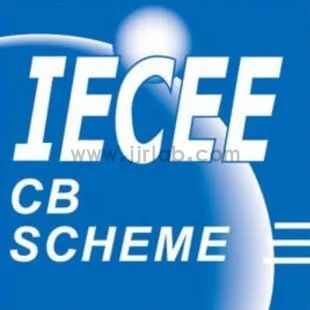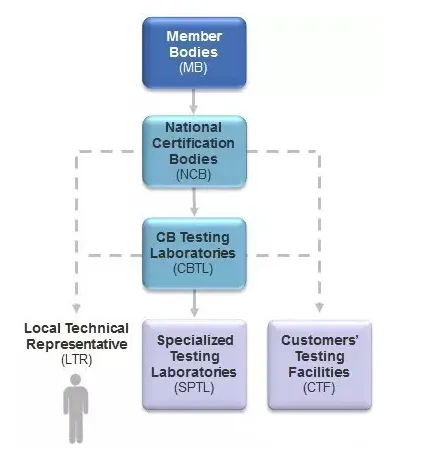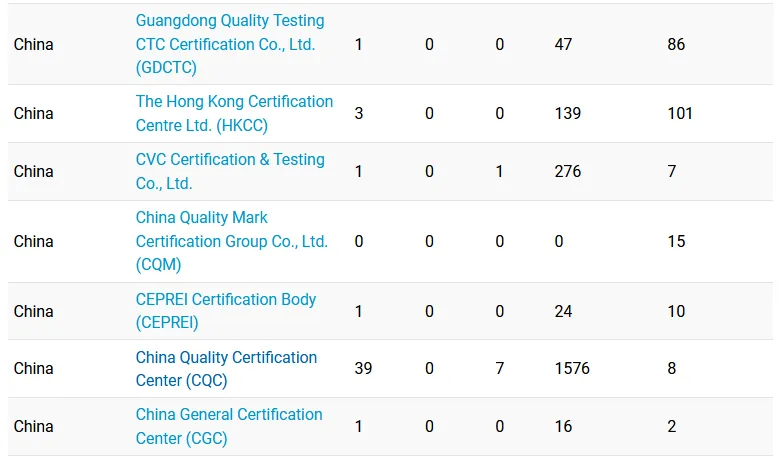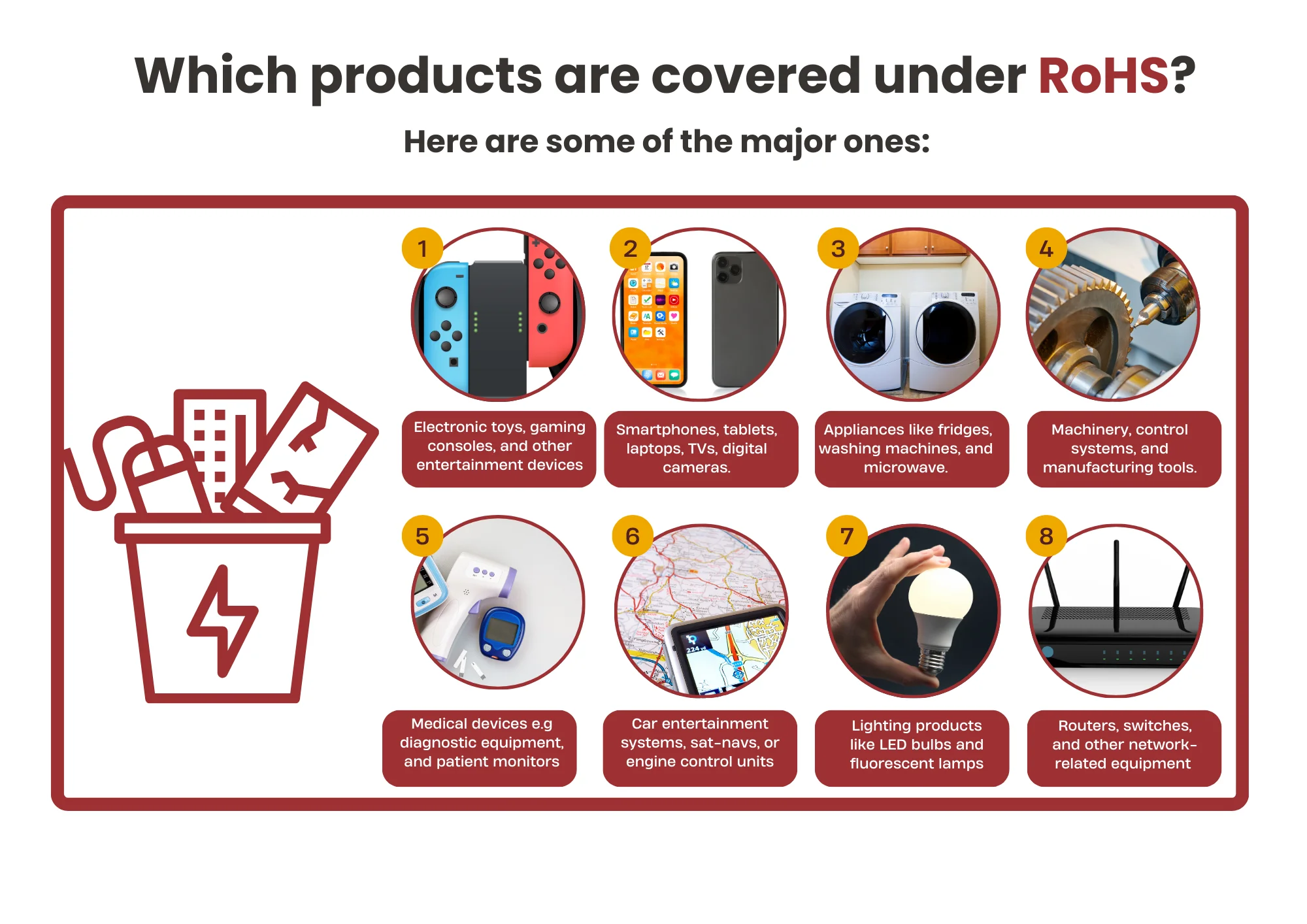
Introduction to IECEE and CB Scheme Certification
The IECEE is an international certification organization operating under the authority of the International Electrotechnical Commission (IEC). Its full name is the "IEC System of Conformity Assessment Schemes for Electrotechnical Equipment and Components."
The ultimate goal of the IECEE's international certification is: one electrical product, tested once against a single IEC standard at any location, with the results of this assessment being accepted globally.
The CB Scheme of IECEE, in Chinese, means the "Mutual Recognition System for Test Certificates for Electrical Products." This system facilitates obtaining national certifications or approvals by mutual recognition (bilateral acceptance) of test results among CB Scheme member countries, thereby promoting international trade.

The CB Scheme applies to electrotechnical products within the scope of IEC standards adopted by the IECEE.
It mainly includes 23 categories such as batteries, photovoltaics, energy efficiency, electromagnetic compatibility, electric toys, industrial automation equipment, electric vehicles, wires and cables, household appliances, lighting equipment, information technology and office equipment, electronic entertainment equipment, power tools, low-voltage high-power equipment, installation accessories and connectors, equipment protection devices, appliance switches and household appliance controllers, capacitors, safety transformers, etc.
A cb test Certificate is a document issued by a National Certification Body (NCB) that participates in the CB Scheme and is qualified to issue and recognize such certificates.
A CB Test Certificate is only valid when accompanied by the relevant CB Test Report.
The execution units of the CB Scheme are the national certification bodies (NCBs) that accept the CB Scheme rules, and these certification bodies use testing laboratories (CBTLs) that are also accepted under CB rules.

Currently, there are 54 member countries, including China, and multiple national certification body members participating in the CB Scheme.

List of NCBs in China:

Manufacturers who have obtained CB Certificates can significantly reduce costs, effort, and time when applying for other certifications.
(1) Enterprises can conveniently convert CB Test Reports into certification marks such as VDE (Germany), GS (Germany), GOST-R (Russia), SASO (Saudi Arabia), RCM (Australia and New Zealand), KC (Korea), PSB (Singapore), SII (Israel), etc.
(2) CB Test Reports can be conveniently converted into China's CCC certification or voluntary certification.
(3) Obtaining cb certification is beneficial for direct recognition by many countries, such as those in Southeast Asia.
The process for manufacturers to obtain product certification for target markets includes:
Submitting an application to the target country's NCB; providing the CB Test Certificate and CB Test Report; and when required by the target market's NCB, supplying product samples. The purpose of requiring samples is to confirm that the product is consistent with the one tested by the initial certifying NCB and that national differences are covered.
Example of CB Certification for Chinese Companies Exporting Lighting to Saudi Arabia:
When Chinese companies export lighting to Saudi Arabia, the main steps include:
1. Obtaining the IEC Test Report for the lighting (CB Test Report) + CB Certification Certificate
2. Conducting energy efficiency testing for the lighting and obtaining the energy efficiency report + EER energy efficiency registration
3. Registering the lighting with the Saudi IECEE
4. Registering the lighting with SABER
5. Applying for the SABER PC Certificate
6. Applying for the SABER SC Certificate
First, it is necessary to obtain the CB Test Report and CB Certification Certificate for the lighting. It is important to note that the CB Report should include testing content that conforms to Saudi standards to prove that the product meets Saudi standards. During Saudi IECEE registration, these two documents need to be submitted.
It is worth mentioning that lighting accessories such as drivers and lamp holders also need to provide corresponding test reports to prove that these accessories comply with the standards of the importing country.
After the application materials are reviewed and approved, the SASO IECEE Certificate (SASO IECEE Recognition Certificate, abbreviated as SIRC, valid for one year) will be issued. The CB Certificate and the IECEE Certificate correspond one-to-one.
Other Considerations:
1. When performing CB certification or conversion for a complete product, some key components, whether built-in or external, also need CB certification. For example, a product with a built-in battery must have CB certification for the battery as well; for a complete lighting product, the LED driver and controller (if any) must also have CB certification.
2. The IECEE does not specify a validity period for the CB Test Certificate. However, NCBs usually raise objections to CB Test Certificates issued more than three years ago.
Email:hello@jjrlab.com
Write your message here and send it to us
 EMC Pre Compliance Testing
EMC Pre Compliance Testing
 PAHs Testing (Food and Textile)
PAHs Testing (Food and Textile)
 Where to Apply for the EU RoHS Test Report?
Where to Apply for the EU RoHS Test Report?
 Children’s Products and Toy Testing
Children’s Products and Toy Testing
 What is a GB 31701 Test Report?
What is a GB 31701 Test Report?
 UN 38.3 Transportation Test
UN 38.3 Transportation Test
 Toxicological Risk Assessment of Medical Devices
Toxicological Risk Assessment of Medical Devices
 How to get the Vacuum Cleaner UL 1017 Test Report?
How to get the Vacuum Cleaner UL 1017 Test Report?
Leave us a message
24-hour online customer service at any time to respond, so that you worry!




